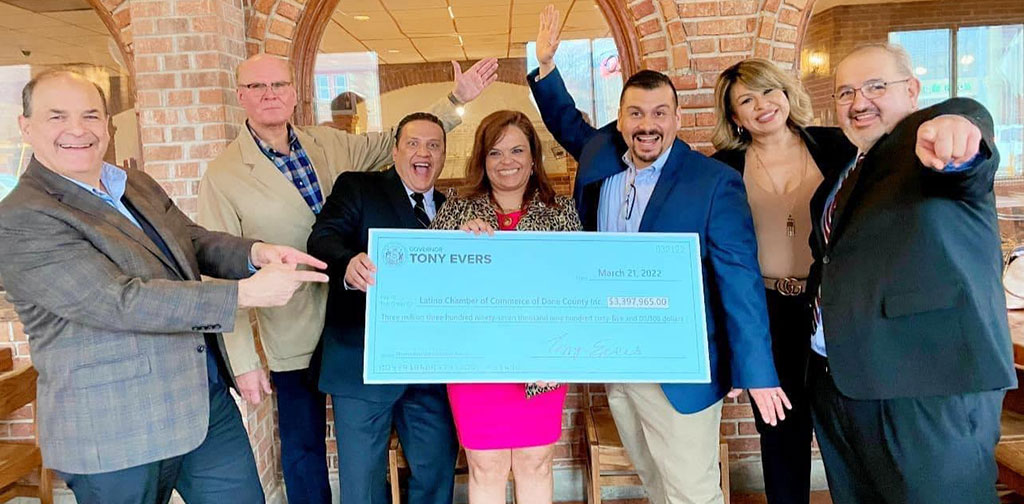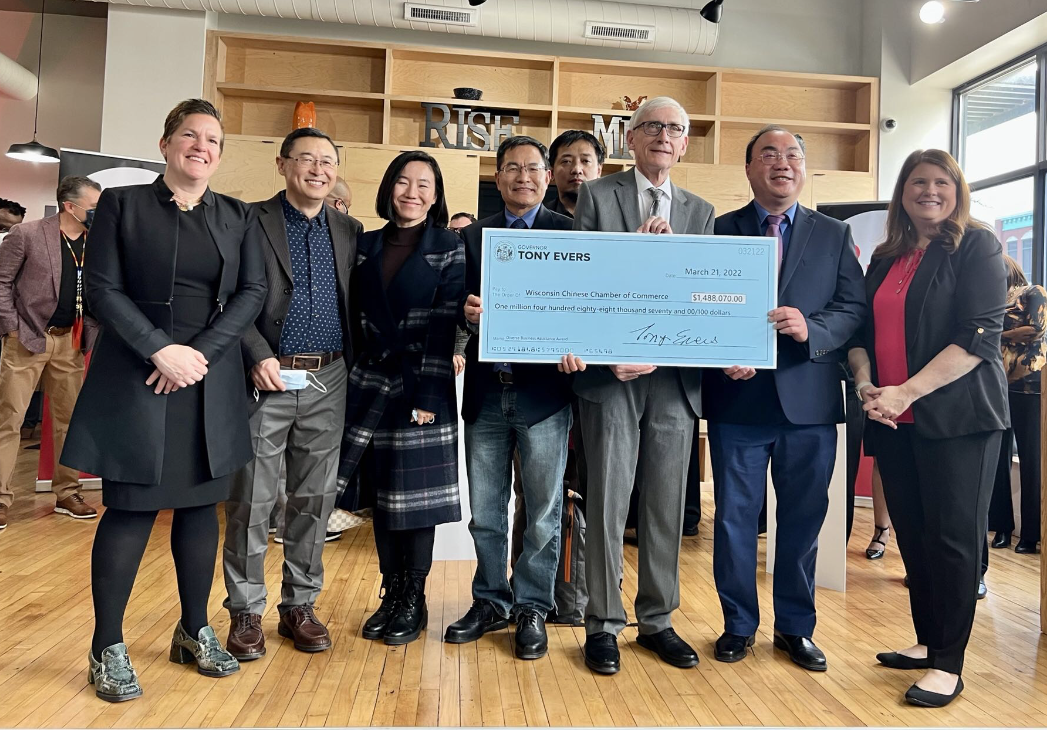Federal funds allocated for pandemic relief are making a difference in communities that have been disproportionately impacted by the pandemic and have historically had difficulty accessing credit and capital.
WEDC provided technical assistance to help partner organizations statewide create and submit successful proposals for the Diverse Business Assistance Grant Program and the Diverse Business Investment Grant Program. The former program awarded $58 million in grants to 24 chambers of commerce and nonprofit organizations providing assistance to small businesses; the latter program awarded $29 million in grants to nine community development financial institutions (CDFIs), which support micro and small businesses not only through lending and providing access to capital and credit, but through programs that provide technical assistance, coaching and mentoring, and credit counseling. Both programs were administered by the Wisconsin Department of Administration with federal funding through the American Rescue Plan Act (ARPA).
“Technical assistance is an important part of the economic development services WEDC provides, supporting our partners in making a greater impact throughout the state by helping them make the most of funding opportunities,” says Sam Rikkers, WEDC deputy secretary and chief operating officer.
“The resources deployed to our long-time partners represent truly a once-in-a-generation opportunity to move Wisconsin forward,” says Missy Hughes, WEDC secretary and CEO.

The Latino Chamber of Commerce of Dane County received a $3.4 million grant, which it plans to use to increase its reach, hire more staff and support those businesses most in need within Latino communities around the state.
The Latino Chamber of Commerce of Dane County was awarded a $3.4 million grant through the Diverse Business Assistance Grant Program. The grant will be used to increase its outreach to rural and growing Latino communities in Wisconsin. The chamber is also using the funding to partner with local municipalities and organizations to create more bilingual programs to address conversation barriers in Wisconsin communities.
“WEDC continues to be a partner in advocating for disadvantaged populations, especially for the Latino populations that we serve,” said Jessica Cavazos, the chamber’s president and CEO. “WEDC is trying to balance and create an equitable economy for all.”
The chamber is planning on moving into a new building in Fitchburg to accommodate its continued growth. Its new “Gateway Building” will allow it to better support and provide resources for Latino business owners.
“With the support of WEDC, the Latino Chamber has not only been able to be sustained but to grow,” Cavazos said.

The Wisconsin Chinese Chamber of Commerce received a $1.5 million grant through the Diverse Business Assistance Grant Program to help the companies it serves improve their digital marketing capabilities.
Through the same program, the Wisconsin Chinese Chamber of Commerce was awarded a $1.5 million grant that it will use to help the companies it serves improve their digital marketing capabilities.
“Of all demographic groups, Asian-owned businesses were the most negatively impacted by the pandemic,” says Chris Gan, the chamber’s president, noting that the number of Asian-owned businesses has dropped by 20% in the last two years—indicating that some businesses have permanently closed due to the hardship—according to a study by the University of California.
The fact that a majority of Asian-owned businesses provide services that, by nature, must be offered in person rather than virtually—such as salons, massage parlors, acupuncture clinics and restaurants—has also contributed to the community being especially hard hit by the pandemic, notes Wenbin Yuan, the chamber’s president. These storefront small businesses are not typically digitally savvy, says Yuan—leading them to neglect the online presence that could help draw new customers to them and help them not only survive the pandemic but come back stronger.
The chamber aims to use the grant funds to help a total of 150 companies over a three-year period, helping business owners master the topics of digital marketing, internet security and related regulations as well as business financing sources. Yuan cites a study finding that every dollar spent on digital marketing generates $7 in revenue; the grant project aims to help business owners make wise spending decisions with their digital marketing budget.
“For a lot of our members, the pandemic really kicked them to the brink of bankruptcy,” says Yuan. “They’ve found a way to survive, but this grant can bring back a sense of optimism by giving them tools and strategies to take their businesses to the next level.”
Also through the same program, the Madison Black Chamber of Commerce was awarded $3.6 million that will allow it to expand its staff to four people, from the current one full-time staff member and one part-time administrative assistant, and to expand its offices to locate within the Urban League’s Black Business Hub.
“We are extremely elated to receive this grant,” says Camille Carter, the chamber’s president and CEO. “Our organization has had a small budget and very limited personnel to execute on the growing needs of the chamber, especially since the pandemic.”
Adding to the chamber’s staff and budget will allow it to expand its programming, such as the financial training it offers for businesses and its Black and Brown Entrepreneur Center (B2EC) incubator. The chamber also plans to add an accelerator program to help more mature businesses reach their next level of growth, as well as a program to develop youth entrepreneurship.
The various organizations supported each other during the process of developing their grant proposals, as part of the Ethnic and Diverse Business Coalition. “With the pandemic, our businesses’ needs intensified,” says Carter. “We really needed to find ways to work together more strategically as community organizations and community leaders across the state. Through WEDC’s alignment, we were really able to come together and support one another when our businesses needed our support the most.”
Since Wisconsin received $1.9 billion in ARPA funding in 2019, WEDC has assisted organizations and businesses in accessing ARPA funds through its business development programs.
In the first weeks of the pandemic, WEDC created the Small Business 20/20 program to help CDFI borrowers cover their loan payments. WEDC also partnered with diverse chambers of commerce to provide targeted Ethnic Minority Emergency Grants, which awarded $2,000 per company to ethnic minority-owned businesses.
Additionally, WEDC has allocated ARPA funds to support programs such as the Main Street Bounceback Grant Program and the Workforce Innovation Grant Program. The Main Street Bounceback Grant Program has helped fill vacant storefronts in all 72 Wisconsin counties, and over 4,000 grants have been made statewide. The Workforce Innovation Grant Program provides regional organizations with funds to help solve their communities’ most pressing workforce needs. After an initial $60 million was awarded to 12 organizations, applications were opened in February for an additional $40 million in funding for the program.
